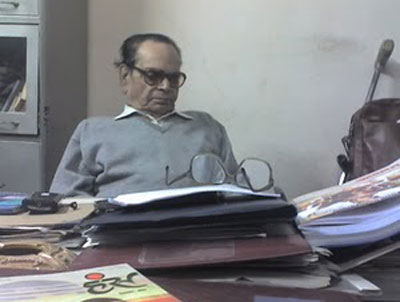 New Delhi:
New Delhi: Renowned Hindi author Rajendra Yadav passed away in New Delhi on Monday night. The 84-year-old breathed his last around 12 o'clock in the mid night. Yadav, who was not keeping well for long time, died while being taken to the hospital.
A fiction writer and a pioneer of the Hindi literary movement known as Nayi Kahani, Yadav was also the editor of 'Hans' magazine.
Hans was started by Munshi Premchand in 1930 but stopped publication in 1953. Yadav re-launched the magazine in 1986 on July 31- Premchand's birthday.
His first novel was 'Pret Bolte Hain' (Ghosts Speak), initially published in 1951 but later renamed as Sara Akash (The Infinite Cosmos) in the 1960s. The novel was also adapted into a movie of the same title, Sara Akash, by film maker Basu Chatterjee in 1969.
Ukhre Huey Log, ('The Rootless People) his next novel, highlighted the trauma of a couple arising out of socio-economic condition which forced them to desert the conventional path.
Apart from several short stories, Yadav wrote two more novels - Kulta (The Wayward Wife) and Shaah aur Maat (Check and Mate).
Yadav co-authored "Ek Inch Muskaan" (A Little Smile) with his writer wife Manu Bhandari, which is a love tragedy of schizophrenic individuals. Yadav also worked as a board member of Prasar Bharti in 1999-2001.
"As the editor of Hans magazine, Yadav promoted a lot of new writers. He began debates on the status of the underprivileged and women, and wrote about sexuality. He will be remembered for his fearless editorial decisions," said Apoorvanand, a leading Hindi commentator.
Hindi writer and academic Manager Pandey said Yadav's death was a big blow for Hans magazine.
"He gave lot of space to Dalit (formerly known as untouchables) and women writers. In his editorials he wrote about the independence of women and their desire to be free. This helped in generating conversations around these issues," he said.
"Yadav was an intellectual activist who was vocal and assertive in highlighting dalit and gender issues that have now become central in Hindi literature. He enjoyed raising issues, engaging with them and creating debates," says Hindi writer Uday Prakash.
The Left-leaning Yadav had a gift for conversation, a memory for anecdotes and a remarkable ability to engage with the young without letting age ever become a barrier. His spartan room at his Daryaganj office always carried the faint smell of tobacco he often smoked from his signature pipe. "He was the most alive individual of contemporary Hindi literature. And he worked to promote causes at the cost of his own writing," says poet Kedarnath Singh.
Along with Mohan Rakesh and Kamleshwar, he was one of the pillars of the nai kahani movement which ushered change in both the content and style of Hindi short stories. Yadav's style was simple and direct; his stories often sought to capture the shifting sands of social and moral values in post-independent India. 'Jahan Lakshmi qaid hai' is one his most remembered short stories.
The title of Sara Akash (1959) -- first published as Pret Bolte Hain in 1951 -- was taken from a poem by Ramdhari Singh Dinkar. The novel, about a young married couple who are victims of patriarchy and ego, and who did not speak with each other for a year after marriage, was turned into a film by debutant director Basu Chatterji. The award-winning effort became a lodestar for the fledgling New Cinema movement in 1970s.
Yadav once told this writer that the novel was based on the life of a friend who didn't speak with to his wife for nine years. "Sometimes truth is too bitter for readers. So I reduced the time of silence between the couple to one year," he said. Few know the film was shot in Yadav's ancestral haveli in Agra's Raja Ki Mandi.
In 1986, Yadav revived Hans, a magazine edited by the peerless Premchand in pre-independence India. Gradually, he turned the magazine into a platform for lively polemics that often shaped discourse in the Hindi world.
"In 2004, he brought out a special issue on dalit writers and made me the guest editor. It was a radical step those days. He gave opportunities to many other dalit writers too. Yadav was a hero among dalits who feted him on several occasions. He was always committed to social justice. That aspect of his personality is irreplaceable in Hindi literature," says dalit writer Sheoraj Singh Bechain, whose memoirs Mera bachpan mere kandhon par was serialized in Hans.
He devoted several issues of Hans exclusively to women's writing. Novelist Maitreyi Pushpa says Yadav wanted women's writing in Hindi to be taken out of city drawing rooms into the fields, villages and jungles. "He wanted rural and tribal women to speak up. He wanted women writers to express themselves in their own voice and encouraged us to write boldly without hesitation or fear," says Pushpa, whose novel Alma Kabutari was praised by Yadav.
Yadav also translated into Hindi the works of Russian writers such as Ivan Turgenev, Anton Chekhov, American John Steinback and French novelist and essayist Albert Camus. He is survived by his wife, renowned litterateur Mannu Bhandari, with whom he co-wrote the novel, Ek inch muskan, and daughter Rachna.
 New Delhi: Renowned Hindi author Rajendra Yadav passed away in New Delhi on Monday night. The 84-year-old breathed his last around 12 o'clock in the mid night. Yadav, who was not keeping well for long time, died while being taken to the hospital.
New Delhi: Renowned Hindi author Rajendra Yadav passed away in New Delhi on Monday night. The 84-year-old breathed his last around 12 o'clock in the mid night. Yadav, who was not keeping well for long time, died while being taken to the hospital.